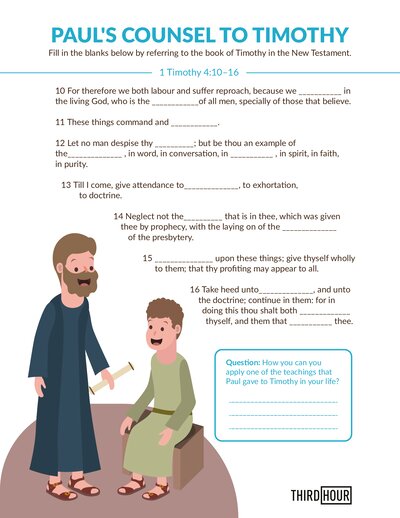“Be Thou an Example of the Believers”
The epistles to Timothy, Titus, and Philemon are different from the epistles we have studied thus far in that they are letters of encouragement to other leaders in the Church rather than to congregations.
Timothy’s mother was Jewish and his father was Greek. He lived in Lystra in what is now central Turkey. Timothy was circumcised by Paul so that Jewish converts would be more attentive to him. Timothy was perhaps Paul’s most trusted and capable assistant.
Titus was one of Paul’s converts. He was with Paul at Jerusalem when circumcision was discussed. He is the person Paul sent twice to the Corinthians to deliver his epistles. It sounds like Titus didn’t spend much time with Paul after that, but was a leader in the Church in various locations, including Crete and Ephesus.
Philemon was also a convert but from Colosse (Colossians). He was the owner of the slave Onesimus, who ran away and joined Paul and was sent back by him with a letter to his master.

Teach true doctrine only (1 Timothy 1):
Paul lists the ways that a person might be enticed to teach false doctrine:
- “Fables and endless genealogies”—for us today, the most tempting fables are what we call “faith-promoting rumors.” Speculation on changes of policy or clarifications of doctrine would fall into this category for us. We are not as tempted by “endless genealogies” as early Jewish converts were. They were exclusionary of those who were not purely Jewish. But is there something special about being descended from Utah pioneers? This would be a fun discussion.
- “Vain jangling”—jangling is a discordant sound, but Paul is referring to vain talking or argument. Every so often you encounter a gospel doctrine class where the teacher goes off on a tangent to display the extent of his/her study and intellect. Then you get comments from a few people trying to show off even more extra study and intellect. Pure doctrine should be the center of our teaching and learning.
- “Desiring to be teachers of the law”—Paul is referring to Jewish converts who dwell on the requirements of the Law of Moses. The law is for those who are going astray, to bring them back. Paul teaches the higher priesthood law, which is written in our hearts. Is it possible for Latter-day Saints to become “Pharisaical”? How can this happen?
Praying for all people (1 Timothy 2):
Lately, President Ballard urged us to pray for our country and its leaders. That request goes along with the counsel of Paul: “[Pray] For , and for all that are in authority; that we may lead a quiet and in all godliness and .” Paul said we should pray for all men. Much has been said about the hollowness of sending “thoughts and prayers” after natural or manmade disasters. Is there any value in our thoughts and prayers? What if we gave up because we felt they had no purpose?
Paul’s counsel to women in verses 9 – 15 is not very popular in the western world today. Why? Does Paul’s counsel have any value? Was it Christian doctrine or cultural influence that caused Paul to write these counsels?
Qualifications for bishops (1 Timothy 3; Titus 1):
Discuss the characteristics noted by Paul that make a good religious leader. Do these hold true today?
- Blameless
- Monogamous
- Vigilant
- Sober
- Of good behavior
- Hospitable
- Oriented toward teaching
- Patient
- Not focused on worldly wealth
- Has a home of order
- A good father
- Reputable
Paul’s description of the Last Days (1 Timothy 4; 2 Timothy 3):
Paul talks about apostasy in the Last Days. He says people will manifest the following characteristics (in 1 Timothy 4):
- They will speak lies as hypocrites
- They will avoid marriage
- They will avoid eating meat
…and the following traits in 2 Timothy 3:
- Lovers of their own selves
- Boasters
- Blasphemers
- to parents
- Unholy
- Without
- Fierce
- Despisers of those that are good
- Lovers of more than lovers of God
- Ever , and never able to come to the of the
Caring for the “worthy” poor (1 Timothy 5):
Paul talks at length about caring for the poor, which has been a requirement for the Church since the beginning. When societies have been ripe in iniquity unto destruction, abuse of the poor has been high on their list of transgressions. Paul talks about widows in this chapter, citing those young widows who become indigent and behave in unseemly ways. A good discussion here might be what the modern restored Church requires of those who receive church welfare.
The love of money is the root of all evil (1 Timothy 6):
Paul says in verse 9: “But that will be fall into and a snare, and into many foolish and hurtful , which drown men in destruction and .” What kinds of lusts can develop in a person who seeks for riches? A variety of these lusts can be viewed in the ads in luxury magazines. How can such a person be tempted away from the faith? Can a person who is poor be tempted in the same way? How do internet “influencers” fuel the love of money?
Paul said we should seek after the following instead: , godliness, faith, love, patience, meekness. How does seeking after these traits affect our relationship with material things?
Paul is talking about the fear of the world and those who are against the church. He encourages Timothy to be strong and faithful.
Vessels of gold, silver, wood, and earth (2 Timothy 2):
Paul likens vessels of these precious to coarse and common materials to the kinds of people we find everywhere, including within the church. We should associate with those who are righteous, humble, and patient. We as vessels need to seek to be sanctified.
For the time will come…(2 Timothy 4):
Paul again predicts the apostasy and the status of men in the Last Days: “For the time will come when they will not sound ; but after their own shall they heap to themselves , having itching ears; And they shall turn away their ears from the , and shall be turned unto . How does this portend our own times?
A house of order (Titus 2, 3):
Paul counsels husbands, wives, children, and servants to be temperate and modest in their behavior. “…we should live , , and godly, in this present world” (v 12).
God is no respecter of persons (Philemon):
Philemon’s servant, a believer, has sought Paul, fleeing from his master. Paul sends him back, pleading with Philemon to welcome him as a brother. Some people are bothered by the fact that neither Moses nor Christ tried to end slavery. Why didn’t they? There are very good reasons. Why would slavery gradually come to an end if we acted on true doctrine?
Lesson Resources:
churchofjesuschrist.org — Come Follow Me


